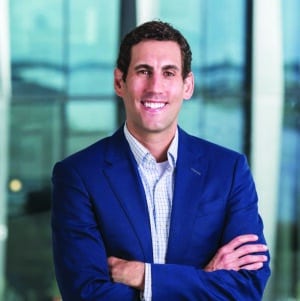Brian Awe
President, The Fallon Co.
Age: 38
Industry experience: 14 years
As a young attorney, Brian Awe got to work with Boston-based Fallon Co. gaining approval from the city of Boston for its signature waterfront project at the Seaport District’s Fan Pier. The 3 million-square-foot development sprouted growth shoots during the Great Recession and illustrated the Seaport District’s potential transformation from an outpost of parking lots into office towers and luxury high-rise housing. Named partner at the DLA Piper firm in 2018, Awe later accepted an offer to join Fallon Co. as president and partner in March 2022. As the firm prepares to develop the final Fan Pier parcel this year, it’s expanding in markets including Charlotte, Nashville and Raleigh-Durham, North Carolina.
Q: What was the impetus for your transition from law to commercial real estate full-time?
A: I very much liked my legal practice. I had great clients and enjoyed the work. I was fortunate to be a strategic advisor to my clients and I was not looking to leave. The Fallon Co. was a client early on, and I got to work with Joe Fallon and his son Mike and the rest of the team over the years and the quality of their projects. Joe does a lot behind the scenes, making an impact on the community. Joe and I got talking a year-and-a-half ago about this opportunity, and it was a nice matching up of what they were looking to do expanding geographically, and a generational transfer to some degree.
Q: What are the strengths and weaknesses of the real estate markets in the metros in which Fallon Co. is currently active?
A: Life science has cooled off a bit in the past year, but in a market like Boston, the institutions are so foundational to what makes Boston so special. Nashville is similar in a lot of ways, anchored by Vanderbilt, but there is also a strong hospital medical environment. Charlotte is a thriving city. It’s a place where the downtown core is driven by financial services. We’re doing a lot of multifamily projects and a partnership with the Charlotte Housing Authority. Raleigh-Durhan is similar, with the research-driven technology focus down there.
Q: Why are some developers still proposing life science buildings in Boston given the disparity between the big development pipeline and tenant requirements?
A: From our perspective, what makes sense is looking at the context of the site, understanding both geographic context and time and demand. There has been a trend to just try to permit a lot of life science because that is the kind of thing that will increase land value, and give the ability to exit at an increased value. Fan Pier is probably the best example. We bought it in 2005, and we will be starting our final building on the site this year: a 124-unit condo building and 13,000 square feet of civic and cultural uses. Our ethos is we’re builders first, so that’s how we come at and view a project.
Q: Are developments facing significant increases in insurance costs and if so, how can those be mitigated?
A: We spend a lot of time on it and it’s a tricky one. Our projects in the Southeast are seeing a tremendous increase related to hurricane-related risks. Boston has less, but has other risks that have driven up development costs higher. That’s what makes the good developers good, figuring out how to address this.
Q: As office and even life science leasing declines, what industries are likely to pick up the slack?
A: In places like the Financial District and Downtown Crossing, it’s challenging. I know the mayor and the Downtown Business Improvement District, where I’m on the board, have spent a lot of time thinking about what to do there. The mayor’s space program at Downtown Crossing is really trying to enliven and fill those retail spaces, and it’s one of those things we are going to have to work through.
Q: Why are so many developers focusing on Sullivan Square and Rutherford Avenue in Charlestown for the next growth cluster?
A: Our [60 Cambridge St. life science development] site is at the Owens Moving Co. lot, and they are actually our partner. We’ve known the family for a long time and it’s a really nice location because it’s the nexus of Boston and East Cambridge and Somerville, which has become one of these nodes everyone wants to be close to. Life science thrives on being close to other life science companies, and it has the benefits of being in the city of Boston.
Awe’s Top 5 Endurance Races:
- Vermont 50 Mile Ultramarathon
- Ironman Mont Tremblant
- Bermuda Round The Sound 10K Swim
- Casco Bay SwimRun
- St. Croix Coral Reef 5-Mile Swim
Editor’s note: This article has been edited to include a longer version of Awe’s answer to the third question.






